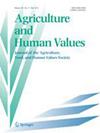A new food security approach? Continuity and novelty in the European Union’s turn to preparedness
Abstract
Preparedness is an anticipatory approach developed in the military and health sectors in response to unforeseen and unforeseeable crises and emergencies. It has recently entered the debate over the resilience and sustainability of European food systems. The paper seeks to shed light on the implications of the European Union's adoption of preparedness in its food security policy, particularly focusing on the preparatory phase and the early activity the European Food Security Crisis Preparedness and Response Mechanism (EFSCM), a consultative body launched by the European Commission in 2021. Through an analysis of documents and meeting minutes, we illustrate how debates on implementing preparedness are influenced by conflicting sociotechnical imaginaries of sustainable food security. Results show that the EU's shift towards preparedness combines elements of continuity and novelty in its food policy. Continuity concerns the acknowledged need to deal with growing turbulence and unpredictability affecting food systems. Novelty involves attempts at building bridges between diverging imaginaries of sustainable food security to address both short-term and long-term challenges to food security. Also new is the shift to a ‘management,’ as opposed to a ‘problem-solving,’ outlook on crisis and emergency.

 求助内容:
求助内容: 应助结果提醒方式:
应助结果提醒方式:


